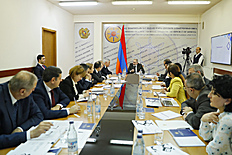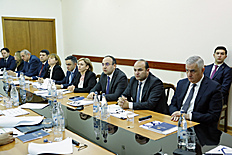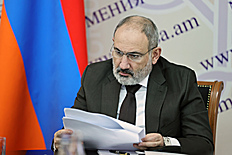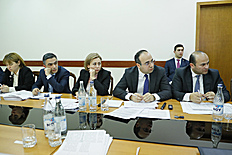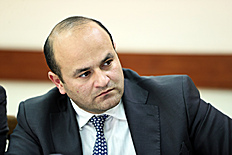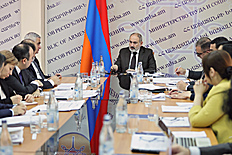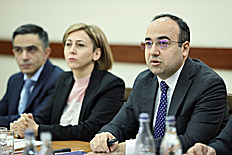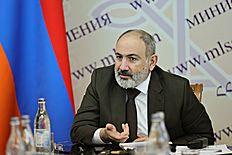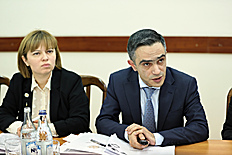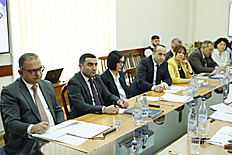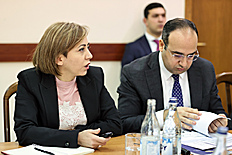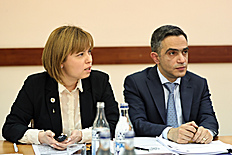Press releases
Activity report 2023 of the Ministry of Labor and Social Affairs presented to the Prime Minister
more 9 photos
On December 22, Prime Minister Nikol Pashinyan visited the Ministry of Labor and Social Affairs to participate in the discussion of the activity report 2023 of the Ministry.
Minister of Labor and Social Affairs Narek Mkrtchyan and the deputy ministers presented the works carried out in the field of labor and social protection, sectoral priorities, also referring to the planned reforms.
The works done in the fields of demography and pension security were reported. The works carried out by the Ministry in the areas of non-cash payment of pensions and benefits, promotion of birth rate, housing provision and a number of other directions were presented.
In connection with the changes in the process of providing care allowance for children under two years of age, the role of measures aimed at encouraging birth has been highlighted. The Prime Minister was also presented with the vision of defining greater guarantees for the provision of one-time benefits for the birth of the 1st and 3rd child, and the necessity of defining more targeted approaches within the framework of the housing program for families with children was emphasized.
Referring to the course of the program of 10% refund from pension and benefit program from non-cash transactions, the officials noted that according to the data of July 2022 the number of beneficiaries of the program was 16,903, the volume of non-cash circulation (monthly) was 0.52 billion AMD, and 390,000 citizens received their pension or benefit by card. As of November 2023, the number of beneficiaries of the program increased by 973% to 164,879, the volume of non-cash circulation (monthly) reached 6.97 billion, an increase of 1,340%, and the number of people receiving pension or benefits by card became 515,000, increasing by 32%.
Prime Minister Pashinyan noted that pensioners should be informed about the changes implemented in this direction. "Before, we used to say: 4-5 banks participate in the program, change the bank, etc. It doesn't matter now, with all banks, 10 percent of pensioners' non-cash expenses are refunded. I appeal to our dear pensioners, especially in rural areas, where shops refuse to accept non-cash payments, to raise the matter to the State Revenue Committee."
Referring to the works carried out in the field of social assistance, details were presented about the process of introducing a new system of insecurity assessment, as well as the programs aimed at social housing construction, and the prospects for their improvement. The new system will enable extremely poor families to overcome extreme poverty and gain employment. The state will make necessary efforts to develop the skills and abilities of families registered in the system of insecurity, which will enable them to get a job and improve the family's living conditions.
Speaking about the dynamics of the number of people receiving benefits, the Prime Minister noted. "Ultimately, we have to solve the fundamental problem here. I see the problem in that we should provide social assistance to a person in poverty, right? On the other hand, we say that there is only one way to overcome poverty, and that is work. At the next stage, we tell the benefit recipient: as soon as you work, we won't help you anymore."
In response, Deputy Minister Anna Zhamakochyan noted that the salary received within 6 months after getting a job is not calculated as income.
Reacting, Nikol Pashinyan noted: "It is obvious that 6 months is not enough. In other words, will a person overcome poverty in 6 months? Like in working, there is psychology in poverty. How will a person overcome that psychological condition in 6 months? It's an adaptation. A person has learned, let's say, lives somehow for 10 years, has a style of living, it is very difficult for any of us to change the style of living in 6 months. Discuss, come to some solutions."
In the work carried out in the field of labor and employment, the role of the large-scale changes in the Labor Code, the establishment of the volunteering institute, the legal regulations of remote work and the work carried out in a number of other directions was particularly emphasized. It was noted that the programs planned in the field for 2024 will be based on the Employment strategy2024-2030. Accordingly, work will be carried out to ensure the employment of the unemployed, the implementation of the employment program based on result-based financing, as well as ensure the employment of those who participated in the military operations and demobilized after 2020, and in a number of other directions.
The Prime Minister inquired about the steps being taken to solve the problems of people who have not fulfilled their obligations towards banks. "Where have we reached in the direction of the program related to bad borrowers?"
Minister of Labor and Social Affairs Narek Mkrtchyan noted. "Our approach was as follows, in order to create motivation for a person to go to the formal field, because according to the current regulations, if he goes to the formal field, then 50 percent of his salary is kept by the Compulsory Enforcement Service. We say that he should have the motivation to repay it through his work, therefore he will be able to participate in that process in the amount of 50 percent of his income tax. We have also discussed with the banks, and they are also ready to freeze the loan so that it becomes a debt."
The Prime Minister also emphasized the issue from the point of view of realization of economic potential. "Because hundreds of thousand people are excluded from our socio-economic life. Those people make a living somehow, don't they? And they obviously work and work in the shadows. At the same time, they, in their turn, are unable to use many of the mechanisms that we provide. In other words, we have to move forward."
At the same time, the Prime Minister added that according to the data of November, an absolute new record of jobs was recorded in Armenia. "We will look into it later. We assume that this, of course, is also facilitated by the employment process of our brothers and sisters forcibly displaced from Nagorno Karabakh, which is also a good impulse. In other words, people have started working," said Nikol Pashinyan.
Speaking about the promotion of work, the Prime Minister noted. "We constantly treat working, employment as a professional ability, etc., but instilling working as a habit in a person is very important, because when working has a place in a person's internal culture and value system, a person cannot not work. In other words, how is it possible for a person not to work? I mean, a person wakes up in the morning, does nothing, does nothing in the afternoon, does nothing in the evening, sleeps at night? This is not only a matter of education, not only a matter of salary, this is a matter of culture, because how can a mature person not work? This is a socio-psychological problem, and that's why I emphasize these programs.
The purpose of that process is not only to get a salary, to gain professional skills, the purpose of that process is also to make work a habit, as an integral part of life. In other words, it should be something like breathing, a person should work, because that is the way to self-realization. In that sense, yes, those programs are important. As for work, our focus should be on 3 groups. The first is people employed in agriculture, who are employed. Our task is that their products also become a countable and taxable part of the economic turnover. The second is the direction of bad loans and the third is the direction of professional training”.
As for the works done in 2023 in the fields of persons with disabilities, the elderly, children, as well as human trafficking and women's issues, the changes implemented in the direction of the introduction of the person's functionality assessment system, the deinstitutionalization policy, the implementation of anti-trafficking measures, and the provision of targeted services to the beneficiaries according to their needs were presented.
Referring to the importance of introducing a new system for evaluating the functionality of a person, the officials noted that since February 1, 2023 it has been operating for persons applying for disability assessment for the first time, and from January 1, 2024 the functionality assessment process will also apply to persons who have applied twice for disability assessment.
The process of social support for forcibly displaced people from Nagorno-Karabakh was also presented.
Prime Minister Pashinyan, referring to the support of forcibly displaced people from Nagorno-Karabakh, said: "Fortunately, we had the opportunity to sufficiently address the problems of the first wave. At that time, the issue was very urgent and we dealt with it on a daily basis. I hope we have not missed the issue of moving forward with medium-term and long-term plans. In other words, we should not let a crack appear, making us to return to the issue in urgency mode. In other words, let's put it in planning mode and move forward like that."
Reference was also made to the issue of counting the pension of persons engaged in agriculture. In this context, the Prime Minister noted. "Now we are introducing a system, especially in the case of universal declaration, that by declaring one's own income and paying income tax, a person can acquire that seniority, which will have an impact on his pension as a result. This is also a very important circumstance. Today, a pensioner receives a pension in the form of the income tax he previously accumulated, there used to be a pension payment, if I'm not mistaken, from the tax formed through those payments? And those who do not have that seniority receive a minimum pension, which is clearly not the most desirable option. Now the farmers will complain that we want income tax from them. But we say “put money from left pocket to right pocket because along with our daily expenses we also have future expenses”.
No matter how much we earn, if we only spend today and don't think about spending tomorrow, tomorrow that problem will face each of us. This applies to the individual, the state, and everyone. Strategic communication is important so that people understand what we do and why we do it. In other words, what we are doing is aimed to solving the issue they raised. But they must understand these mechanisms so that negative reactions do not occur," Prime Minister Pashinyan concluded.
